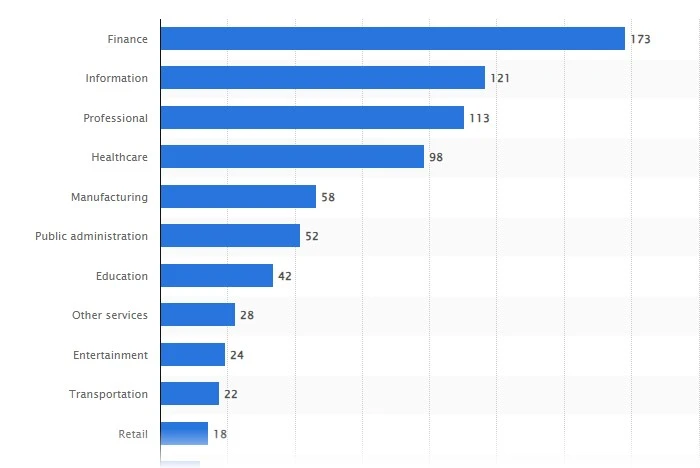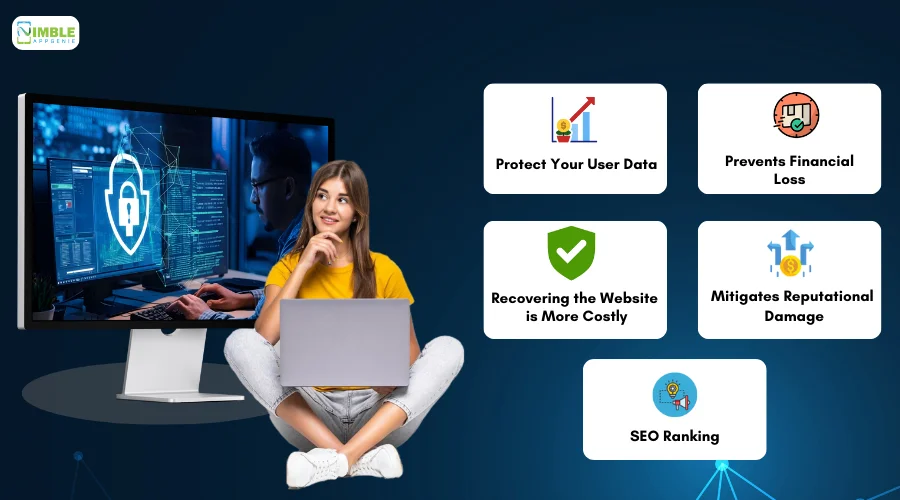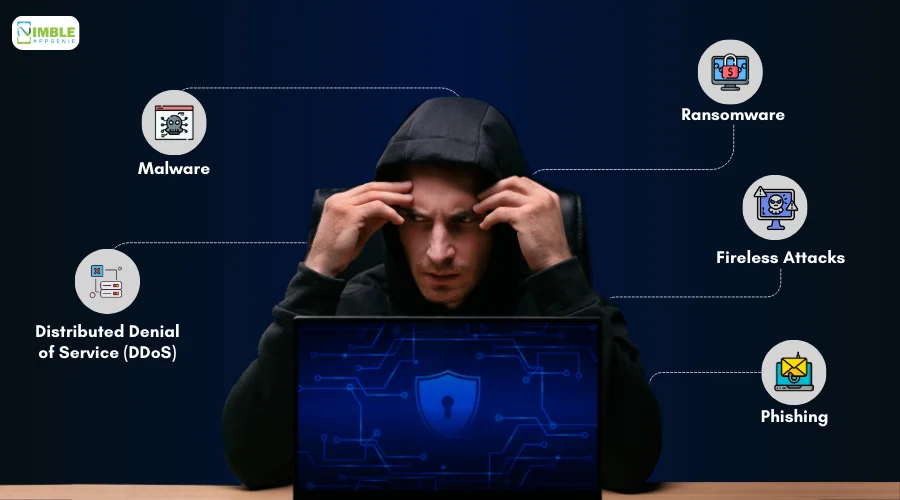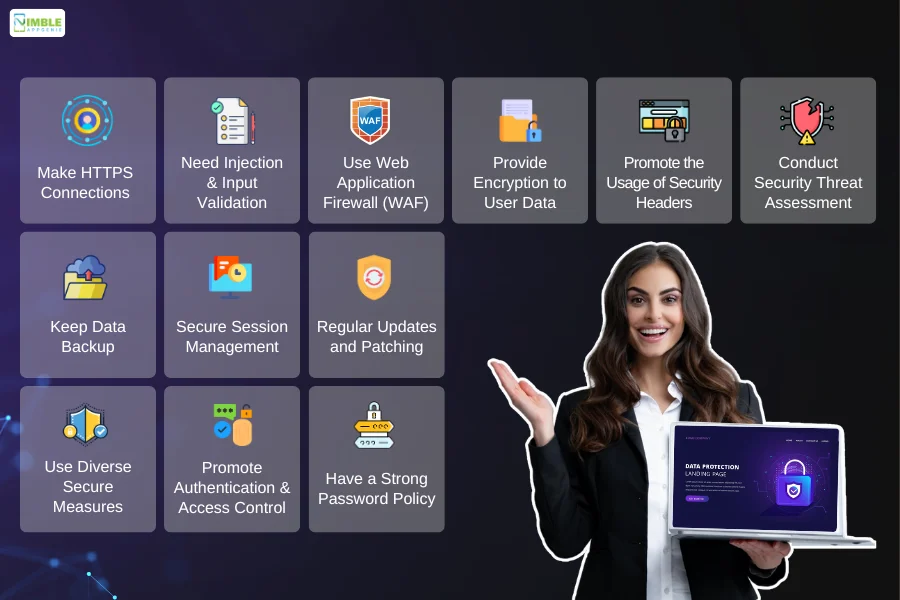Is your Website Secure What are the measures you usually undertake to do this?
Think about it. This is one of the important concerns nowadays. Website application development security not only assists you with the data but also with future cybersecurity threats.
The three main goals of security are confidentiality, integrity, and availability. It’s hard to achieve all three. Robert H. Morris
In the traditional practices of web security, it had taken the back seat. However, in the current era, considering security as a secondary practice can be your first and last mistake for your web survival.
Then, what is the solution?
Well, you should have a list of the best web development security practices that can help you keep a check on all requirements.
Here, you will find it all. From the need for web security to the best practices, we have provided you with a package for cyber security and web development. Let’s dive into it.
An Overview of Web Security
Before you proceed with the practices, check an overview of security for those who are unaware of it.
Web Security is a term that refers to the practice of protecting your website and web pages from several types of threats and vulnerabilities. It protects the networks as well as computer systems from damage to the theft of software, hardware, or any type of data.
Increasing cybersecurity cases has become an important reason for the boom of the web security market.
A market research on web security can help you with information about the growth of its market and other useful data.
Want to study some market Stats?

- Between November 2021 and October 2022, the financial industry was the most targeted by 173 basic web application attacks worldwide.
- In 2023, the monetary damage due to cyber attacks increased to 12.5 billion U.S. dollars.
- The revenue of the security technology and services market worldwide is expected to peak at 188.1 billion U.S. dollars.
Why Care for Website Security?
Studying the market statistics might have provided some quantitative parameters for using website application security. You have seen a significant rise in cyber threats within the coming years. It calls for you to have a web development security checklist.
However, you need to choose the right tech stack to implement security measures.
Before that, you need to understand the reasons behind securing your web page. Here is a list that you can refer to.

A] Protect Your User Data
Websites collect a large amount of data that raises a call for storing their sensitive user information such as personal details, payment information, and login credentials can be best practice to protect user data.
If any cyber thief comes to your website that does not have any security measure Then it can become easy for them to steal your customers’ identity in order to make fraudulent purchases.
B] Prevents Financial Loss
Security breaches can lead to a great financial loss for both the website owners and users. Here, businesses can incur costs which is associated with the incident response, legal fees, and damage control.
Cyber attacks can impact the company financially. Ransomware demands are one of the worst parameters for financial loss. Keeping up with the security vulnerability can be a challenge although, you can ensure the security of your website with the right technique.
C] Recovering the Website is More Costly
To recover from a hacked website is not impossible, but it takes a lot of resources. Here you have to pay hundreds of dollars to clean up the website and get back on track.
This creates an urgency for website development security. It can impact your overall budget for website performance optimization and can make you suffer all week or months long. Therefore, in order to avoid such suffering, you should secure development for the web.
D] Mitigates Reputational Damage
A security breach not only affects the targeted website but also can affect other entities such as partners, affiliates, and advertisers. You should prioritize the web page security to mitigate the reputational damage.
Once the reputation of your website goes, it never remains the same. It is very hard to earn the reputation of your company, right? Hence, you must take successful measures to protect it.
E] SEO Ranking
Based on the GoDaddy reports, 73.9% of hacked websites are due to SEO purposes. Hence, you should adopt the web security best practices along with a strong SEO strategy. It can have a devastating impact on your overall website rankings.
Such kind of issue is caused by hackers as well as website scrapers. Seeing the unfamiliar 404 errors over the search console for pages is one of the examples of how web security impacts SEO. You can develop SEO friendly website with effective website development security.
Website Security Threats
You have studied the reasons to protect your web by implementing cyber security in web development.
Well, you should be aware of the cyber threats that can vastly impact your webpage. It can help you in identifying suitable practices depending on the certain cyber threat issue. Let’s have a list below to assist you with common threats that can impact your website.

-
Malware
Malware is an important malicious code that is inserted into the system to impact the confidentiality, integrity, and availability of the data. This is designed within the system to gain access to the computer system. It includes viruses, worms, trojans, adware, spyware and ransomware.
-
Ransomware
It is a kind of malware designed for using encryption to force the target of attack which locks the computer system. Here, a ransom payment is demanded in exchange for restoring access to data and the devices. It can even cause a financial loss as it encrypts the users’ files which can be valuable for the company.
-
Distributed Denial of Service (DDoS)
This kind of attack makes the online service unavailable by overwhelming it with excessive traffic from diversified locations and multiple sources. Here the cyber criminals develop large networks of infected computers that are named Botnets by planting malware. This threat can disrupt the services which can result in downtime and financial loss.
-
Fireless Attacks
It is a modern type of cyberattack that focuses on manipulating the behavior of legitimate applications and systems to drive malicious outcomes. It is very difficult to detect such kind of threat in your computer system because it is built to set commands to functions that are built within the computer system.
-
Phishing
This is a fraudulent act that is drafted to acquire sensitive information such as user names, credit card details, and passwords by implementing this software as a trustworthy entity within electronic communication. It has been one of the most common methods for cyber attackers to launch a campaign due to its ease of use.
What are the Best Ways to Secure Your Website
Till now, you have well understood the reasons for adopting cyber security in web development, along with the lists of cyber threats that can impact your overall web development process.
Now, it’s time to answer how to secure a website.
Well, all you need is critical security tips for web development. You can hire web developers for this scenario. Shall we proceed with the same?

1. Make HTTPS Connections
You can implement a hypertext transfer protocol secure (HTTPS) network as an important protocol that is useful in encrypting data that is exchanged between a user’s browser and a web server. It can be effective to make a website like OnlyFans.
This kind of encryption can prevent sensitive information including login credentials, bank account details, and other personal data. It also protects the confidentiality of the data in transit by making it significantly more complicated for attackers to tamper with information.
2. Need Injection & Input Validation
Input validation and injection are among the tips for web development security that are used to check the user input to ensure that it is a valid and safe measure to use. If you fail to validate user input, it can result in security vulnerabilities.
Here you should use secure socket layer (SSL) and transport layer security (TLS) protocols. These are essential for web applications and for enhancing communication between the client and the server.
3. Use Web Application Firewall (WAF)
It is an essential security tool that assists in protecting web application architecture from a variety of attacks that comprise SQL injection, cross-site scripting, and other common web-based attacks. These can be effective cyber security web development protocols for your web page.
This tool acts as an HTTP traffic filter which safeguards the communication of the company’s server with the client. It helps protect malicious requests from penetrating and compromising the database.
4. Provide Encryption to User Data
Do you know how top web development frameworks protect their user data? Encryption is only the basic key and process of encoding the information to protect the data from the one who is not authorized to access it.
While utilizing web service and API, you should not only implement an authentication plan but should also use the data encrypted systems. Users’ data is precious and a lack of data safety can impact your brand’s reputation. Hence choose the encrypted data software wisely.
5. Promote the Usage of Security Headers
The HTTP headers refer to different parameters of information exchange that take place between a web server and an end user’s machine. There are two ways of protecting HTTP headers.
Different kinds of security headers can be X-frame options that stop a page from rendering in a frame created by HTML tags and X-content-type options. You can also use refer policy, X-XSS protection as well as content security protection for protecting communication between server and client.
6. Conduct Security Threat Assessment
You should adopt security threat assessment practices in order to identify potential vulnerabilities, understand threats, and implement appropriate countermeasures. These practices are developed to evaluate the potential impact and likelihood of security incidents.
Such secure web development best practices can be helpful in building the trust and confidence of your end user by addressing security threats. Demonstrating a commitment to security assists in building credibility that ends up in protecting the reputation of web pages.
7. Keep Data Backup
After implementing web development security best practices, there can be many chances of cyberattack. To avoid it, you should always take enough backup measures as a precaution steps. Such a tip can help you in protecting your customer’s data as well as your brand reputation successfully.
If you suffer a breach or other sort of hack then this backup will be crucial in reinstating the functionality of your web. To protect the data from web threats, data backup is an important strategy. This process can save you website development costs as ensuring data backup can be useful for further analysis processes to update or make a new feature within it.
8. Secure Session Management
Software development services often use secure session management for securing web applications. Secure session management is important because it involves the management and control of user sessions to protect against unauthorized access.
Within the session management hijacking and fixation are two attacks that can compromise your user’s sessions. You should utilize strong session IDs and can regenerate them. Moreover, you can set session expiration time to protect your user ID from getting hijacked.
9. Regular Updates and Patching
Are you avoiding regular updates and web maintenance practices? Then, it can be your biggest mistake that can overhand your web page to a cybercriminal or to a cyber thief. Hence regular updates and patching are among significant web app security best practices to make a website like Medium.
You should try to keep all software components including web servers, frameworks, and libraries up-to-date with the latest security patches for addressing vulnerabilities and also for reducing the risk of exploitation.
10. Use Diverse Secure Measures
To ensure security in website development, you should implement diverse security measures. There are different measures available for website development security, although not a single parameter can guarantee complete success for your web page.
Hence, to ensure complete web application security, you should use vulnerabilities in developing it. Adopting multiple measures can act as an essential tool that can be integrated into web development security. It can also reduce the amount of work that a security team performs.
11. Promote Authentication and Access Control
Authentication is an important procedure for verifying the identity of the user, system, or entity that attempts to access certain resources and systems. The process of authentication provides security in web development by restricting unauthorized users from gaining access to sensitive information.
Authorization as well as authentication are essential components that work together and ensure that only legitimate users can get access to the resources to perform authorized actions.
12. Have a Strong Password Policy
We have come so far to answer how to secure a web app. Here you can advise web users, on how to have a strong password for maintaining robust security online. You can also have a guide on the password policy that can help you to keep user IDs safe.
Moreover, you can try to add a tutorial on educating the web’s users to set high passwords on pages that can direct them to use a strong ID. Unique passwords can be one of the options for improving web development security.
How Nimble AppGenie Can Help You Secure Your Website?
Web development security is an important practice that can increase your web reputation and protect your web page from any type of cyber threat. Well, you need the right team that you can trust for your web development page.
Nimble AppGenie can be your partner in this process. We are the best website development company with expertise in the field.
Our well-skilled experts can help you add a secure network to your web page that can ultimately result in ensuring the growth of your website. Choose a wise team that can provide you a complete web protection.
Conclusion
In today’s digital landscape, the security of web development is paramount. Cyber threats are evolving rapidly, posing significant risks to both businesses and users. It’s crucial to understand the importance of web security and adopt comprehensive solutions to safeguard digital assets.
Expertise across various aspects of web security, from implementing HTTPS connections and input validation to deploying web application firewalls and encryption protocols, can protect user data and mitigate financial losses. Hence you should prioritize implementing robust security measures to protect your website’s online presence.
FAQs
Web page security is crucial for protecting user data, preventing financial losses, mitigating reputational damage, maintaining SEO rankings, and ensuring overall website integrity.
The main goals of web security are confidentiality, integrity, and availability. These goals aim to protect sensitive information, ensure data accuracy and consistency, and maintain uninterrupted access to web resources.
Common web security threats include malware, ransomware, distributed denial of service (DDoS) attacks, fireless attacks, and phishing scams. These threats can compromise user data, disrupt services, and damage website reputation.
HTTPS connections encrypt data exchanged between a user’s browser and a web server, protecting sensitive information such as login credentials and personal data from unauthorized access or tampering.
Input validation ensures that user input is valid and safe, preventing security vulnerabilities such as SQL injection or cross-site scripting attacks. Implementing secure socket layer (SSL) and transport layer security (TLS) protocols further enhances communication security.
A web application firewall (WAF) protects web applications from various attacks, including SQL injection and cross-site scripting. By filtering HTTP traffic, it prevents malicious requests from compromising the database and helps maintain web application security.
Regular updates and patching ensure that software components, including web servers and frameworks, are up-to-date with the latest security patches. This reduces the risk of exploitation by addressing known vulnerabilities and enhancing overall web security.

Niketan Sharma is the CTO of Nimble AppGenie, a prominent website and mobile app development company in the USA that is delivering excellence with a commitment to boosting business growth & maximizing customer satisfaction. He is a highly motivated individual who helps SMEs and startups grow in this dynamic market with the latest technology and innovation.
Table of Contents







No Comments
Comments are closed.